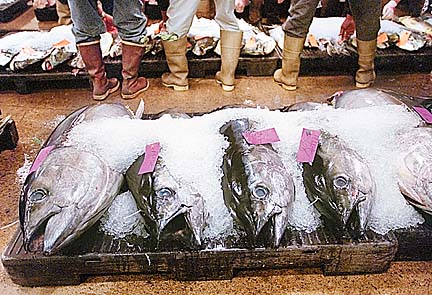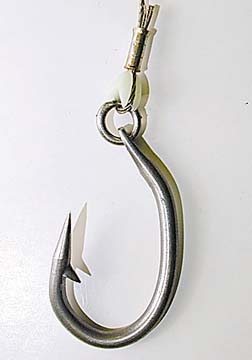


Hawaii longline fishermen were to reel in their hooks today, probably for at least three weeks, while they wait for a court ruling on their future again. Hawaiian longliners
battle sea turtles for jobsDespite accounting for only 3 percent
By Diana Leone
of Central Pacific fishing, some boat
owners could go bankrupt because
of endangered species
Star-BulletinThe downtime could last until May 31, or longer.
It'll cost, according to Hawaii Longline Association President Sean Martin, $180,000 a day for the boats to stand idle.
It'll mean vastly decreased fresh fish supplies, said Frank Goto, manager of United Fishing Agency, the state's largest fish auction, which gets about 90 percent of its catch from longliners.
And many fishermen will have trouble feeding their families while they wait for the ruling, said a number of people speaking at a public hearing before the Western Pacific Regional Fishery Management Council meeting at the Ala Moana Hotel on Tuesday.
"I'm sorry we have to be here," said Mark Powell with the Center for Marine Conservation. The situation could have been prevented, he said, if Hawaii's longline industry had been more concerned about damage to endangered sea turtles 10 years ago.

Powell said counts of dead sea turtles that numbered as high as 299 a year in the past were "entirely excessive" so, conservation groups, including his, had to sue to get turtles the protection "long overdue."That lawsuit awaits a ruling by U.S. District Judge David Ezra. But before he can rule on what's best long-term for protecting sea turtles, Ezra has to review an environmental impact statement still being prepared by the National Marine Fisheries Services.
That study is due on the judge's desk by April 1. It will be there the last week of March, William Hogarth, acting assistant administrator of National Marine Fisheries Service, said to a crowd of more than 150 at the council meeting Tuesday.
More than 20 people testified for more than two hours -- mostly raising concerns about a Fisheries Service document that foreshadows what the environmental impact statement is likely to say. The "biological opinion" is required by the Endangered Species Act.
A draft of the opinion was released Friday and recommends:
>> An end to all swordfishing by Hawaii longliners.
>> A ban on tuna longlining for a nearly 2 million square mile area south of the Hawaiian islands five months out of the year (Jan. 15-June 15 from 0 to 16 degrees North latitude and 145 to 180 degrees West longitude).
>> Stricter vessel permit rules, so longliners can't fish part of the year in Hawaii and part of the year elsewhere.
People associated with Hawaii's fishing trade who spoke at yesterday's meeting weren't happy about the Fisheries Service's recommendations.
For one thing, noted Hawaii Longline Association's Martin, the Hawaii longline fleet only accounts for 3 percent of the boats fishing the Central Pacific. No foreign boats will be affected by the U.S. laws, he said.
While Hawaii longliners won't be hooking as many turtles if they curtail their fishing season, the turtles could be hooked by fishermen from other countries.
"Our little fleet is just a drop in the bucket," said Mike Hind, owner-captain of the Heola longliner. "It's not like just by closing the swordfishery we're going to save the turtles."
Rebecca Lent, with the National Marine Fisheries Service, agreed that hooking a turtle is a "rare event" for Hawaii longliners. "We cannot save the turtles alone in the U.S.," she said, "but anything we can do to try and figure out ... what kind of gear, what kind of soak time (for hooks in the water), what we can do to decrease 'takes' and increase survival" can be used as a model for international rules.
Glynn Ross, who has a seafood business, called the proposal "the worst attack on the Hawaiian people since the bombing of Pearl Harbor."
"As a woman longliner in Hawaii, this will probably make me an endangered species," said Teri Ann Akamine. "With a closure coming up, I can't see myself being in this industry any more."
After several people spoke about the hard-working fishermen and their belief that their livelihood doesn't endanger the turtles, Hogarth reminded those present that the Endangered Species Act does not take into consideration economic effects on humans.
"What is important -- turtle or human life," asked Kim Hyo Sun, whose family are longliners. "We have no other way to eat if we don't go fishing. Who is going to support us these two months?"
After the day's testimony, the Western Pacific Regional Fishery Management Council resolved to ask Judge Ezra to keep fishing open until he actually has the environmental impact statement.
If the closure lasts too long, it'll mean some boat-owners could go bankrupt, said boat owner Kim Hung.
The fish auction's Goto said the fishing shutdown will affect consumers in a few weeks, when fish caught right up to the deadline makes it back to port. If the fisheries service and judge follow the biological opinion's guidelines and restrict tuna longlining five months a year, longliners' incomes could drop 25-30 percent a year, he said.